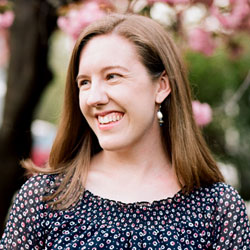
Meghan Roth Clayton '08
Minister, Salem United Methodist Church, Mathews, VA
After William & Mary, I attended Wesley Theological Seminary in Washington, DC and pursued a Master of Divinity. During my three years of graduate studies, I also concurrently worked in the Spiritual Life Department at Shenandoah University and then the American University Kay Spiritual Life Center. I was ordained in full connection with the United Methodist Church in spring 2015, and in October 2015, I received my second appointment as a solo pastor at a small church in Middle Peninsula.
Intentionally or not, I have always actively pursued an interdisciplinary approach to my learning. While in the English department, I did a great deal of coursework looking at the religious and spiritual motifs in literature. While in seminary, I found myself taking all the possible courses that involved literature, poetry, and writing. Fortunately, Wesley's Henry Luce III Center for Arts and Religion emphasizes the importance of many forms (visual art, written word, etc.) to communicate religious and spiritual themes.
An English degree was the best foundation for seminary, as I could analyze texts well and think critically about their meaning and implication. This continues to be the case in my pastoral ministry. Strong writing contributes to effective preaching. However, a good written word does not always mean it will "preach." Delivering more sermons is helping me develop a stronger internal voice which affects how I write. Integrating my love for reading, writing and teaching with a calling to serve in a church setting is critical to me. As a pastor, I study texts, read commentaries and other resources, and prepare and deliver a weekly "paper." I teach classes for congregants, and I attempt to incorporate literature and poetry into these courses.
In what can be a volatile environment for people of various faiths and backgrounds, thoughtful people are needed to engage difference, translate meaning and propose ways forward in the midst of misunderstanding and conflict. I think English majors are up for the task! They have needed skills to assist in promoting multi-religious literacy, communicating to promote common ground, and thinking critically about healthy ways of relating. I would encourage students with an English degree to consider employment in religious and spiritual fields. Most seminaries and divinity schools do not require students to enter pastoral ministry; in fact, many, Wesley included, help students find their way into non-profit work, teaching, and other creative venues.
I encourage everyone to work with your professors in regard to your interests. They will likely support you in selecting research topics that incorporate various fields of study, and they might be able to connect you with other departments to do some interdisciplinary work as well. I connect my skills in text analysis, critical thinking and sermon preparation to my coursework in the English department. At this point in my life, I would like more opportunities to teach, whether in the local church or in other settings, possibly academic communities, and I continue to seek them out. During seminary, I began some creative writing, which I would like to pursue further.














